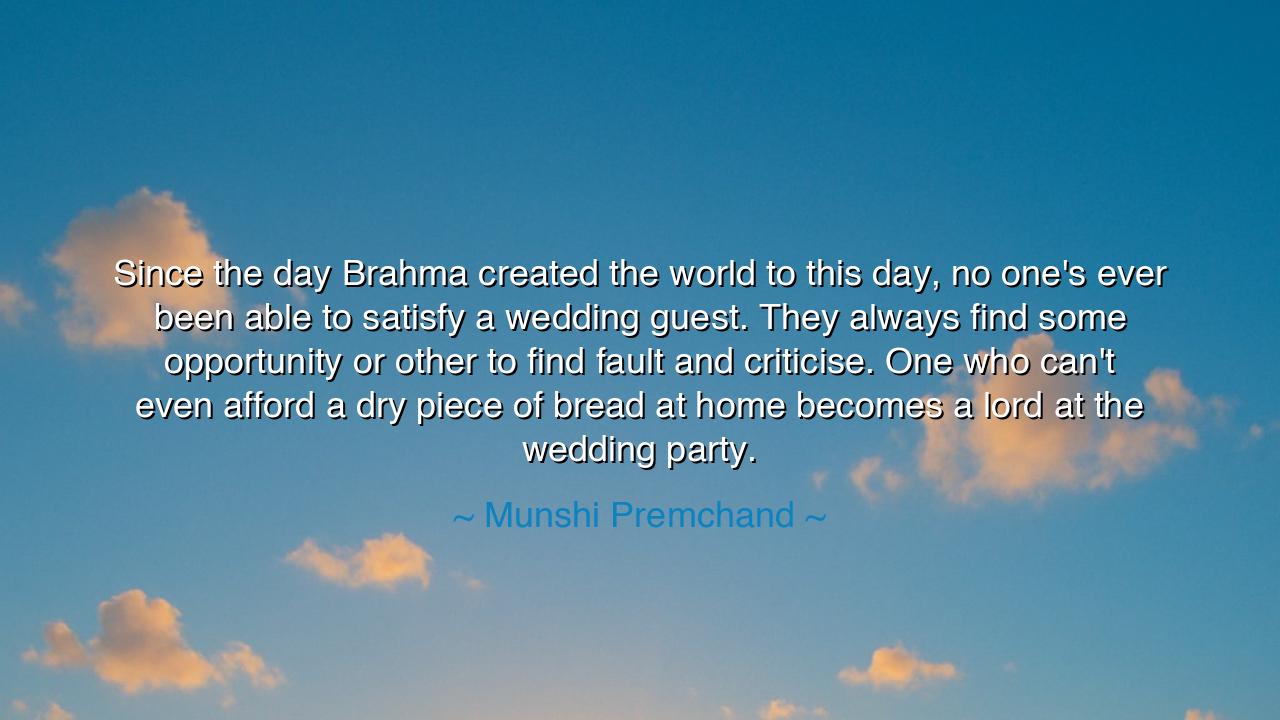
Since the day Brahma created the world to this day, no one's ever
Since the day Brahma created the world to this day, no one's ever been able to satisfy a wedding guest. They always find some opportunity or other to find fault and criticise. One who can't even afford a dry piece of bread at home becomes a lord at the wedding party.






There are truths so ancient and so unchanging that they echo through every generation — truths about human nature that no progress of civilization can erase. Such is the wisdom captured in the words of Munshi Premchand, one of the greatest voices of Indian literature, who wrote: “Since the day Brahma created the world to this day, no one's ever been able to satisfy a wedding guest. They always find some opportunity or other to find fault and criticise. One who can't even afford a dry piece of bread at home becomes a lord at the wedding party.” Though humorous in tone, this quote carries a deep and timeless understanding of pride, vanity, and the peculiar blindness of human discontent.
Premchand, a master observer of society, drew his wisdom not from the palaces of kings but from the humble courtyards of ordinary people. He saw with clarity that gatherings meant to celebrate love and unity often become theatres of envy and complaint. By invoking Brahma, the creator in Hindu cosmology, he places this flaw — the tendency to criticize, to compare, to elevate oneself through judgment — at the very heart of humanity’s origin. It is not new, he says; it has been with us since the dawn of creation. What he reveals, then, is not merely the behavior of guests at a feast, but a reflection of the human condition itself — our inability to find contentment even in joy, our impulse to measure others rather than give thanks for what we receive.
In the image of the wedding guest, Premchand finds a mirror for society. The wedding, in ancient and modern times alike, has always been a symbol of union, generosity, and abundance — a sacred rite where families and communities come together to honor love. Yet, in that very abundance, human ego often awakens. The guest, who at home may live with little, suddenly becomes a critic of the feast. He forgets gratitude and takes up the mantle of judgment, weighing every dish, every decoration, every courtesy, as though he were emperor of the world. Thus Premchand’s saying becomes a parable about ingratitude and the illusion of superiority — how easily we, who receive, imagine ourselves to be above those who give.
Such behavior is not bound to weddings or to India alone. The ancients of every land recognized this folly. In the courts of Athens, philosophers mocked the man who, offered a meal, found fault with the flavor of the olives. In Rome, satirists like Juvenal wrote of guests who arrived hungry but left only with disdain. Even the wise Confucius cautioned that the ungrateful heart “seeks fault in the banquet of kindness.” Across cultures, the same truth unfolds: that dissatisfaction is a hunger of the spirit, not the stomach. The one who cannot be content with a gift will find bitterness even in plenty.
There is also deep moral irony in Premchand’s words — “One who can’t even afford a dry piece of bread at home becomes a lord at the wedding party.” Here he exposes not only arrogance but hypocrisy. He speaks of those who, in their ordinary lives, struggle quietly, yet in public assume the airs of nobility, forgetting humility and gratitude. This transformation of the poor man into “a lord” at another’s celebration reveals the strange theater of human pride: how quickly we adorn ourselves with borrowed grandeur when given the chance. Premchand, with his gentle wit, invites us to laugh — not at others, but at ourselves, for we have all, at some time, played this same foolish role.
Consider, for a moment, the life of King Lear from Shakespeare’s tale. Surrounded by flattery, he mistook praise for love and generosity for power. When he gave his kingdom away, the same mouths that once lauded him turned to mockery. Like the wedding guest who scorns his host, those around Lear revealed how easily gratitude turns to judgment when the feast no longer serves our pride. The story of Lear, like Premchand’s observation, teaches that the heart untrained in humility will always find reason to complain, even in the presence of blessing.
Thus, the lesson that flows from Premchand’s words is both simple and profound: Gratitude is the highest form of wisdom. To find fault is easy — it is the work of the idle and the ungrateful. But to see beauty in imperfection, to honor effort over excess, to appreciate even a small act of generosity — this is the mark of a noble spirit. Let no man or woman attend the banquet of life as a critic, but as a guest filled with thanks. For every feast, no matter how humble, is sacred when received with humility.
So let this teaching be remembered: whether in a wedding hall or in the quiet table of daily life, approach every gift with gratitude, not judgment. Do not become the “lord” who forgets his own hunger; instead, be the humble guest who blesses the host. In doing so, you not only honor others, but also free yourself from the endless hunger of dissatisfaction. For as Premchand reminds us through laughter and wisdom alike — the fault-finding guest may never go hungry for food, but he will always starve for joy.






AAdministratorAdministrator
Welcome, honored guests. Please leave a comment, we will respond soon